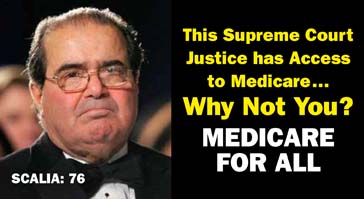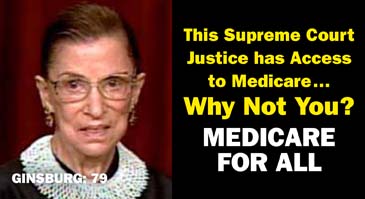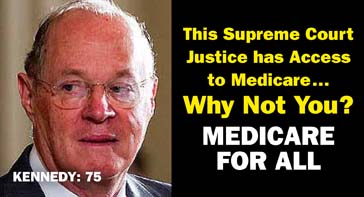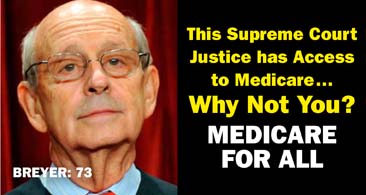
Justices Antonin Scalia, Anthony Kennedy, Ruth Bader Ginsburg, and Stephen Breyer did not have much in common during the three days of debate on the 2010 healthcare law before the Supreme Court March 26-28.
But they did have one essential characteristic in common. All four will never have to worry about guaranteed access to healthcare.

They won't have to worry about being bankrupted by medical bills, about denied needed treatment their doctor recommended because some insurance bean counter deemed it "experimental" or "not medically necessary."

They won't have to worry about being barred from choosing the provider of their choice because they were 'out of network' or forced to keep an unwanted job to maintain their present employer-paid coverage.
Why? It's not just because of their wealth, or even their federal paychecks or federal health plan., It's because all four are over 65, and thus eligible for Medicare -- which gives the four justices the same guaranteed coverage that every other American at 65 has. The same coverage that all Americans need and deserve.

None of those roadblocks are removed under the law the judges spent so many hours debating.
More striking this week, this case which dominated the court's agenda and massive media coverage probably would not have been in front of the court at all.

If, the Obama administration and the Democrats on the Hill had fought for the reform they should have pursued from the outset -- lowering the Medicare age to zero. For more than 45 years, Medicare has stood the test of time and law. It works, even when its opponents try to underfund or privatize or destabilize Medicare. Today Medicare remains a more efficient, cost effective, humane system for delivering healthcare, and guaranteeing it to everyone who is eligible, in a far superior manner to the broken dysfunction privatized insurance system based on profit and ability to pay, not on patient need.
Sure, the Affordable Care Act does have some positive elements, including some restrictions on the abuses that characterize the insurance industry, and the provision that lets young adults up to 26 to remain on their parents' health plan.
But even if Obamacare survives the court challenge -- a prospect looking increasingly dim -- it would leave millions of Americans out in the cold.
Despite its name the Affordable Care Act has done little to actually make healthcare affordable. Out of pocket health costs for families continue to soar. It does little to crack down on insurance companies denial of medical treatment they don't want to pay for. It leaves anywhere from 15 to 20 million Americans with no health coverage.
And for many who are covered, it further tethers them to a callous, insurance system that treats patients as commodities, not as individuals with individual needs.
Whether the law is overturned or left in tact, our healthcare crisis will continue. A mountain of statistics bear the ongoing nightmare faced by far too many. Just a few examples:
A February Pew Center report noted a 16 percent jump in the number of Americans heading to emergency rooms for routine dental problems, at a cost of 10 times more than preventive care with fewer treatment options than a dentist's office.
Medical bills for years have been the leading cause of personal bankruptcy. Increasingly they ruin people's credit as well. A Commonwealth Fund report earlier this month found that 30 million Americans were contacted by collection agencies in 2010 because of medical bills.
The percentage of adults with no health insurance at 17.3 percent in the third quarter of 2011 was the highest on record, up from 14.4 percent just three years earlier, Gallup reported.
On quality, the U.S. continues to lag far behind other nations.
More than 80 percent of U.S. counties trail life expectancy rates of nations with the best life expectancies, the University of Washington found last June. Some U.S. counties are more than 50 years behind their international counterparts.
There is an alternative, one that most of the other industrialized world has long embraced. One that should be back on the table whether the Court overturns the law or not.
Single payer, Medicare for all. If Medicare is good enough for grandma, and for Scalia and Breyer and Kennedy and Ginsburg, it ought to be good enough for all of us.
